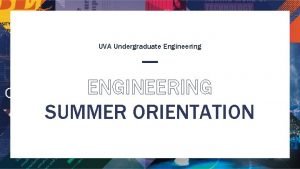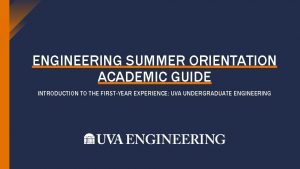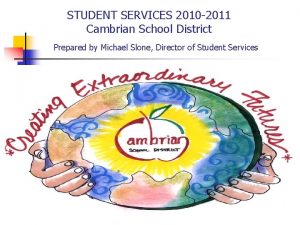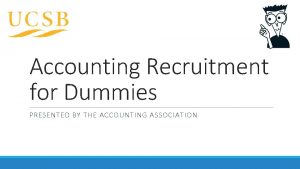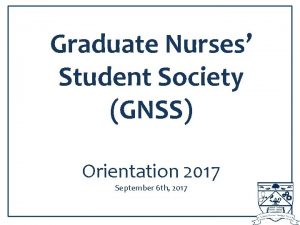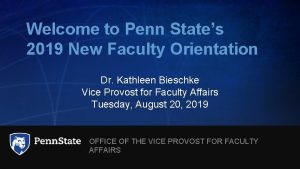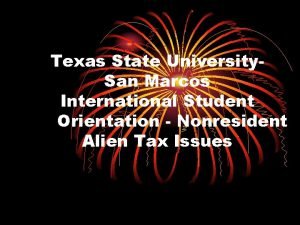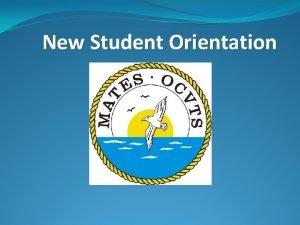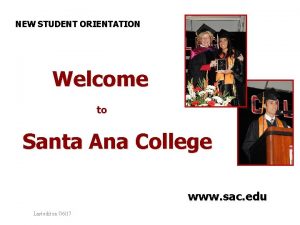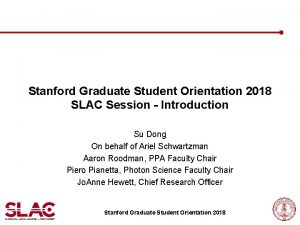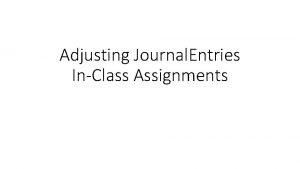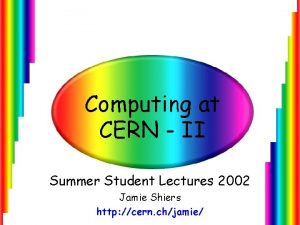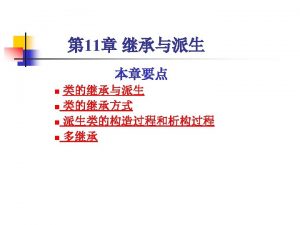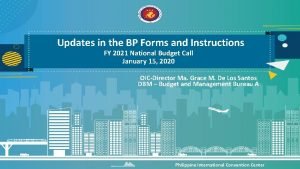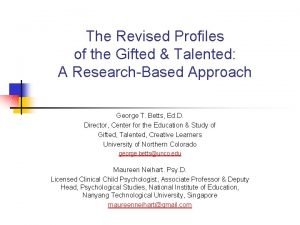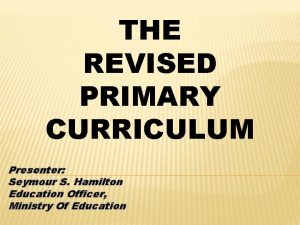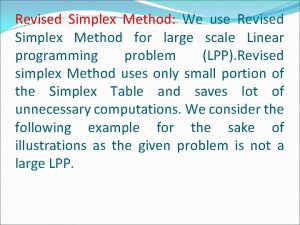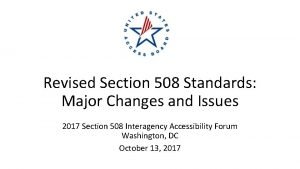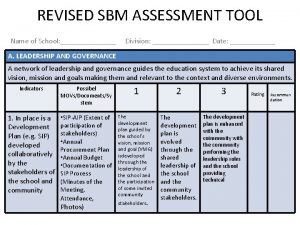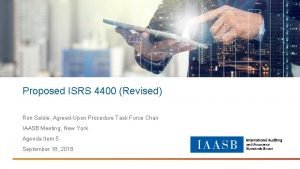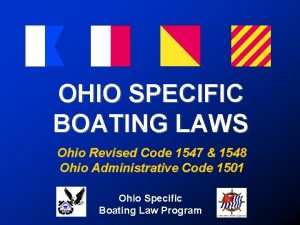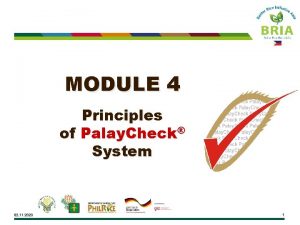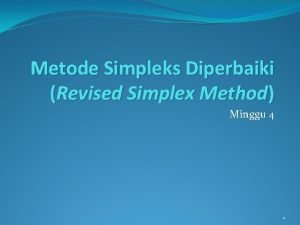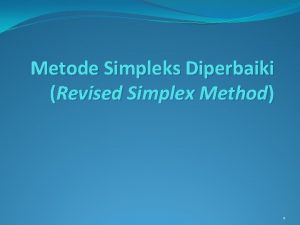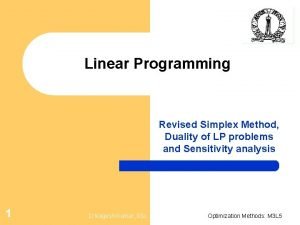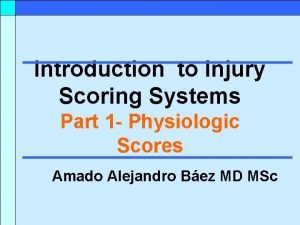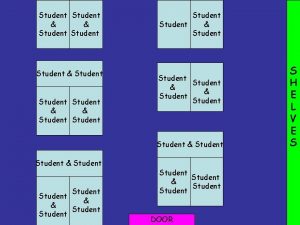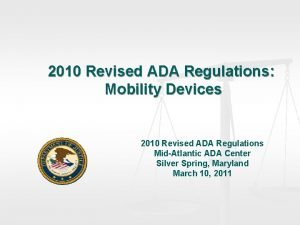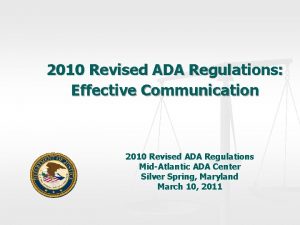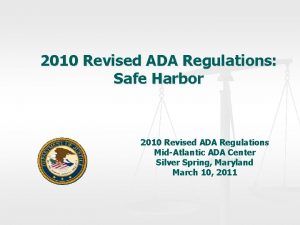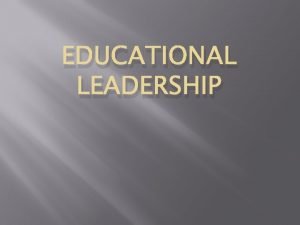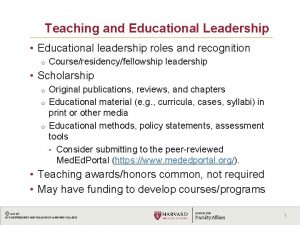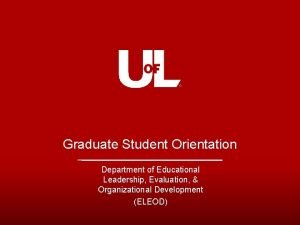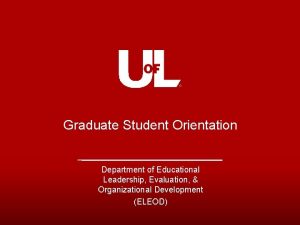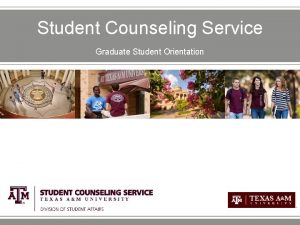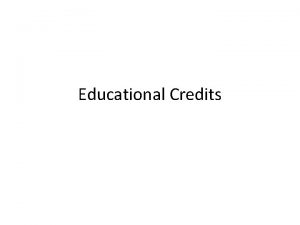Educational Leadership Student Orientation Summer I 2010 Revised


















































- Slides: 50

Educational Leadership Student Orientation Summer I 2010 Revised 12. 2. 10

Agenda • • • Welcome & Introductions Admission Status Vision Statement Program Expectations Procedural Issues Internship Certification & TEx. ES Library Questions Degree Planning

Welcome to TAMU-Commerce • A Short History Lesson: • William Mayo founded East Texas Normal College in Cooper in 1889. • Since those humble beginnings, Texas A&M University. Commerce has been educating the people of Texas, and beyond. • Now a member of the prestigious Texas A&M University System, the university has campuses in Dallas, Mesquite, Navarro College and Midlothian, and conducts classes in Mc. Kinney, the Collin County Community College District, and at Northeast Texas Community College.

Welcome to TAMU-Commerce • A Short History Lesson: • When the State of Texas purchased the campus in 1917, the name was changed to East Texas State Normal College. In 1923, the school was renamed East Texas State Teachers College. • The graduate program was added in 1935, and in 1957 the Legislature, recognizing that offerings had broadened from teacher education, changed the name to East Texas State College. • Following the inauguration of the first doctoral program in 1962, the name was changed to East Texas State University and in 1996 became Texas A&M University-Commerce. • The vibrant campus hosts a state-of-the art planetarium, recreation center, and science building - soon to be joined by a multimillion student center and an alumni center.

Welcome to TAMU-Commerce • Mayo’s founding creed of "ceaseless industry, fearless investigation, unfettered thought, and unselfish service to others" continues to this day. • The Principal Preparation Program is located in • the College of Education and Human Services • The Department of Educational Leadership • http: //www. tamu-commerce. edu/home/

Welcome to TAMU-Commerce • The Department of Educational Leadership • Campus Location: • Young Education North #113 • Mailing Address: • Department of Educational Leadership PO Box 3011 Commerce, Texas 75429 -3011 903 -886 -5520 or 903 -886 -5607 • FAX: 903 -886 -5507 • Website Address: • http: //www. tamu-commerce. edu/edl/

Welcome to TAMU-Commerce • The Department of Educational Leadership is home to these programs: • • Educational Administration (EDAD) Higher Education, Educational Technology, Training & Development • A listing of Faculty is located at http: //www. tamucommerce. edu/edl/faculty. htm • A listing of Staff is located at http: //www. tamucommerce. edu/edl/staff. htm

Mission Statement The Department of Educational Leadership at Texas A&M University-Commerce prepares graduates for teaching, service and leadership roles in a variety of educational, business, government and industry contexts.

Vision Statement The Department of Educational Leadership at Texas A&M University-Commerce envisions exemplary programs that challenge highly-qualified students to excel in their respective disciplines and careers through engagement in a rigorous and transformative learning environment linking theory to practice while expanding the knowledge base of the learner, the profession, and the respective academic discipline.

Admission Status • Steps to Full Admission 1. Application and acceptance to Graduate School • Application, GRE scores, Transcripts, Recommendations, Fees, etc. • Receipt of a Letter of Acceptance from Graduate School • NOTE: IF THIS IS YOUR STATUS, YOU CAN ONLY TAKE SIX HOURS BEFORE RECEIVING FULL ADMISSION BY THE DEPARTMENT. ANY HOURS TAKEN OVER THE FIRST SIX HOURS WILL NOT BE ACCEPTED!!!!

Admission Status • Steps to Full Admission 2. Application and acceptance to Principal Program in the Educational Leadership department 1. Materials are forwarded to department from the Graduate School. 2. Materials are reviewed according to departmental criteria. 3. Receipt of an acceptance letter from the department. 4. YOU ARE NOT FULLY ACCEPTED UNTIL YOU HAVE RECEIVED THE ACCEPTANCE LETTER FROM THE DEPARTMENT!!!!!!

Admission Status • You will be pursuing one of three tracks: 1. A Master’s degree ONLY • A total of 36 hours 2. A Master’s degree AND Principal Certification • A total of 36 hours (for both degree & certification) 3. Principal Certification ONLY • Must hold a valid Master’s degree • A total of 24 hours 4. NOTE: NO COURSE MAY BE OLDER THAN SIX YEARS AT THE TIME OF COMPLETION OF THE DEGREE AND/OR CERTIFICATION

Admission Status • Transfer Credit: • You may request up to six hours of graduate courses for transfer to your degree plan or certification plan. • All requests are subject to approval by the Principal Program Governance Committee. • You cannot transfer: • Not all graduate courses are eligible for consideration for transfer due to the requirements of content for certification • A research course taken at another university. You must take EDAD 595 (or an equivalent) from Texas A & M University—Commerce. There are no exceptions. • An internship course (of any kind) from another university.

Admission Status • Transfer Credit: • If you want to request transfer credit, you must contact the program coordinator and complete a Transfer/Substitution Course Request for Master’s Degree Form. • Transfer credit must meet Graduate School guidelines and have Department of Educational Leadership approval. • In seeking Departmental approval of a transfer course, you may be asked to provide documentation of the content of the class you want to transfer to verify that it meets program content requirements.

Program Expectations • Congratulations, you are a Graduate Student. What does that mean exactly? • First, you have reached a new level of education. • Educational opportunities over and above the traditional K 12 school experience is called “higher education”, which implies a new level of teaching and learning. • Graduate level educational experiences are “higher” than “undergraduate” learning experiences, which implies a still higher level of teaching and learning. • As a Graduate Student, you will be expected to read, write, and converse at a scholarly level, which is deeper, more analytical, more critical, more insightful, and conforms to the demands of an academic discipline tradition.

Program Expectations • What does that mean exactly? Con’t • Second, you have made a choice to be here. • The very nature of the program is to meet the needs of working professionals. • However, having a commitment to a teaching (or other) position does not negate or circumvent your commitment to the demands of this program of graduate study. • Only you can decide what kind of course load to take for each semester. • Whatever your course load, you will be expected to meet the expectations of the faculty and the demands of the program. • That means:

Program Expectations • What does that mean exactly? Con’t • Third, you will be expected to be responsible for your own learning. • Typically, in graduate level courses, the instructor is the facilitator of the learning experiences for a course. Their job is to create and/or maintain learning experiences and to provide guidance to you on your journey through them. Your job is to make the journey. • This means that you must be self-motivated to engage the learning opportunities and self-disciplined as a learner in order get the most out of each learning opportunity. • To do this you must be committed, dedicated, disciplined, engaged, prepared, and persistent.

Program Expectations • What does that mean exactly? Con’t • Fourth, you will be expected to produce work that will be held to high standards. • Why should this be so? There are several reasons: • First, mediocrity is not acceptable. Anything worth doing, should be worth doing well. • Second, your professional growth is dependent upon achieving at high standards of performance. School districts want leaders who are top notch performers to lead their schools. Here’s your chance to prove yourself. • Third, your students deserve your best efforts. Students deserve the best that can be found to lead their schools. • Finally, our reputation depends upon it.

Program Expectations • What does that mean exactly? Con’t • In sum, you will get out of this experience exactly what you put into it. • Just remember this: Nobody gets a medal for being average. • Why would you invest all the time, effort, and financial resources to do average work and receive an average education?

Program Expectations • What do you get in exchange for your time, effort, and money? • First, you get an educational experience that is a blend of academic rigor and practical application. • The very nature of a graduate degree is embedded in the commitment to scholarly activities with an academic focus. That includes exposure to and interaction with the literature and theories that are currently in the field of educational administration and leadership. • At the same time, our students need ideas and concepts as well as resources that will be useful to them as practitioners. That means, helping you to stock your toolbox, so that you have the right tools to do your job as an school leader.

Program Expectations • What do you get in exchange for your time, effort, and money? Con’t • Second, you get capable and qualified professors. • All of our faculty have earned a doctorate from an established and accredited university. • All of our faculty have backgrounds and experiences in the leadership of public schools and districts in Texas. • All of our faculty are researchers in the field of educational administration and leadership. • All of our faculty are published in the academic literature of the field. • All of our faculty are dedicated learners in some aspect(s) of the field of educational administration and leadership.

Program Expectations • What do you get in exchange for your time, effort, and money? Con’t • Third, you get an education rather than training. • Training implies gaining knowledge and skills necessary to do a particular job. Often the scope of what is learned is applicable to only one setting or situation. • Education implies gaining knowledge and skills as well. But an education goes beyond a single setting or situation by challenging students to remember, understand, apply, analyze, evaluate, and create. In addition, the knowledge encountered may be factual, conceptual, procedural, or meta-cognitive in nature. • An education prepares students for the future. Training prepares students for a job.

Program Expectations • What do you get in exchange for your time, effort, and money? Con’t • Fourth, you get professors who care about your progress and development as a future educational leader. • The professors in the Educational Leadership department are dedicated to your success—not only in a particular class, but in completing your degree and/or certification. • With this in mind, we are interested in your development as a student, as a colleague among your fellow students, and as a future leader of campuses and districts.

Program Expectations • What do you get in exchange for your time, effort, and money? Con’t • Fifth, you get a degree that means something and the satisfaction that you have accomplished your goal. • When you complete your degree and/or certification, you will be proud to know that Texas A & M—Commerce holds a respected reputation among educators and leaders of the state. • You will also be proud of the fact that you persisted and not only earned a degree, but have met the qualifications the state of Texas demands of its educational leaders. • You will be pleased with yourself as you remember: if it was easy, everyone would do it.

Program Expectations • Writing in a Scholarly Setting: Some Issues to Consider • First, writing is part and parcel of a graduate education. • You should expect to write in each course you take. Length of assignments will vary, but the product—that you understand can write in a scholarly style—is critical to your success as a graduate student. • Writing is important to your development as a thinker and as a effective communicator. • It takes practice to gain the comfort level and ease of use that is required to be a successful scholarly writer.

Program Expectations • Writing in a Scholarly Setting: Some Issues to Consider • Second, scholarly writing is very different and a discipline of its own. • Scholarly writing operates from the objective point-of-view— there are generally no personal pronouns (ie. , I, we, our, you, etc. ) in scholarly writing. • The writer is simply reporting the facts or results of one’s efforts without personal commentary. • Scholarly writing strives to get to the point, lacks embellishment, and seeks to effectively communicate, but it is not necessarily trite or sterile. (That’s where the practice comes in. )

Program Expectations • Writing in a Scholarly Setting: Some Issues to Consider • Third, the department subscribes to a specific type of scholarly writing style. • The designated manual for scholarly writing, references, and citations in the Educational Leadership department is the following: • Publication Manual of the American Psychological Association (5 th ed. ). Washington, DC: American Psychological Association. • Get the manual and learn to do it right.

Procedural Issues • Course Requirements: Master’s Degree Core Courses: • EDAD 615 Leading Effective Schools • EDAD 626 Using the Law in Educational Practice • EDAD 595 Using Research for Best Practice • EDAD 574 Developing Quality Instruction Programs (ILD) Required Courses: • EDAD 508 Facilitating Learning for Diverse Learners • EDAD 607 Using Evaluation and Data for Improvement of Learning • EDAD 619 Designing Curriculum for Effective Instruction • EDAD 623 Allocating Resources of Effective Learning • EDAD 656 Building Capacity for Effective Learning • EDAD 554 Leading the Learning Community • EDAD 610/614 Leading Learning Communities Internship • One Elective: EDAD 597, 612, 618, 622, 658; or another approved graduate course

Procedural Issues • Course Requirements • Start at the beginning: • EDAD 615, 626, 574, 595 must be taken first, before any other courses can be taken. • Once these are completed, you may finish all other courses in any order. • However, it is recommended that you take EDAD 554 (The Principalship) at the end of your program (as scheduling permits).

Procedural Issues • Course Requirements: Certification ONLY Core Courses: • EDAD 615 Leading Effective Schools • EDAD 626 Using the Law in Educational Practice Required Courses: • EDAD 508 Facilitating Learning for Diverse Learners • EDAD 619 Designing Curriculum for Effective Instruction • EDAD 623 Allocating Resources of Effective Learning • EDAD 554 Leading the Learning Community • EDAD 610/614 Leading Learning Communities Internship • One Elective: EDAD 597, 612, 618, 622, 658; or another approved graduate course

Procedural Issues • Course Requirements • Start at the beginning: • EDAD 615, 626 must be taken first, before any other courses can be taken. • Once these are completed, you may finish all other courses in any order. • However, it is recommended that you take EDAD 554 (The Principalship) at the end of your program (as scheduling permits).

Procedural Issues • Course Requirements • Work in your Internship(s): • Students earning a Master’s degree AND certification must take one semester of internship: either EDAD 610 & 614. • Students earning a certification ONLY must take one internship class: either EDAD 610 or 614. • Internships are to be completed in the FALL or SPRING semesters ONLY.

Procedural Issues • Course Requirements, Con’t • Electives: • Under the new degree/certification plan, students should take electives which are available through the Educational Leadership department, including EDAD 594, 597, 612, 618, 622, 653, 662. These courses are offered during various semesters. • However, other graduate courses are acceptable with departmental and Graduate School approval.

Procedural Issues • Course Requirements, Con’t • Comps: • All students earning a Master’s degree must take a written comprehensive examination over course content within the program. • Comps are graded Pass/Fail, and students must pass all sections to be eligible for graduation. • The exam is offered in the Fall, Spring, and Summer. • Comps should be taken during the last semester of academic work prior to graduation. • The Master’s Comps Study Guide can be found at www. tamu-commerce. edu/edl/pubs-forms/index. htm.

Procedural Issues • Degree Plans • The Master’s degree plan is for planning purposes to assist in the selection and completion of coursework. • Coursework for degree plans must be completed within six years (from first course to last course). • Degree plans are not official until it is signed by the following persons, filed with the Registrar, and approved by the Graduate School at the end of your program. • • The student’s advisor (can be any Faculty member) The Educational Leadership Department Head The Certification Officer

Procedural Issues • Degree Plans • The following should be on file in the Educational Leadership office prior to the filing of the degree plan: • • • Professional recommendation(s) from a fully certified school administrator Copy of your Texas teaching certificate Copy of all graduate transcripts Copy of your Service Record from your district’s personnel office indicating two years of public school teaching experience Completed application for admission to Professional Certification Program (application located at www. tamucommerce. edu/teacher/forms/professional_newform. asp) Printed confirmation of a paid $50 filing fee from the above website

Procedural Issues • Certification Plans • The certification plan is for planning purposes to assist in the selection and completion of coursework. • Certification plans are not official until it is signed by the following persons, filed with the Program Director, and approved by the Graduate School at the end of your program. • • The student’s advisor (can be any Faculty member) The Educational Leadership Department Head The Certification Officer • Coursework for certification plans must be completed within six years (from first course to last course, including TEx. ES exam).

Procedural Issues • Certification Plans • The following should be on file in the Educational Leadership office prior to the filing of the certification plan: • • • Professional recommendation(s) from a fully certified school administrator Copy of your Texas teaching certificate Copy of all graduate transcripts w/evidence of a Master’s degree Copy of your Service Record from your district’s personnel office indicating two years of public school teaching experience Completed application for admission to Professional Certification Program (application located at www. tamucommerce. edu/teacher/forms/professional_newform. asp) Printed confirmation of a paid $50 filing fee from the above website

Procedural Issues • Degree & Certification Plans • Degree and certification plans are to be governed by the Texas A & M—Commerce Graduate Catalog, and is the last word on all matters. • Other important information is provided in the Educational Leadership Master’s & Certification Handbook located at this address: www. tamucommerce. edu/edl/pubs-forms/index. htm. • Look for the Educational Administration Master’s and Principal Certification Handbook listing. • Note: Your degree plan is not a contract.

Internship • Each student will complete at least one semester of internship. • Information regarding the internship is located at the following address: www. tamucommerce. edu/edl/pubs-forms/index. htm • Look for the Principal’s Certification Internship Packet listing. • Read this document carefully as it has information that is critical to the success of your internship.

Internship • The purpose of the principal internship is to bridge the gap between theory and practice and students’ academic and experiential learning. • The internship should provide opportunities for students to work with and to learn from administrators in schools. • Through field-based experiences, the student has the opportunity to strengthen his or her qualifications and gain practical experience. • Prerequisites: EDAD 615, 626, 574, 595. • Internship courses must be taken at TAMU-Commerce. Transfer credit for other internships will not be accepted.

Internship • The principal internships in Educational Administration (EDAD 610 or 614) are components of the principal certification process. • Each course is one semester long for which the student will receive 3 semester credit hours. • Students wanting to take either of these courses must complete an Internship Proposal and submit it to the Internship Coordinator by the deadline for each semester: July 15 for Fall semester or Nov 15 for Spring semester (See the Internship Proposal Handbook for details).

Internship • For each semester of internship, students are required to accrue 160 hours of activities that are standardsbased. • The required internship activities include: • A log of activities (with supportive artifacts) • Reflections (particularly on the connection of theory and practice) • Professional Development (off campus activities) • Group Meeting (minimum of one per semester) • Self-Assessments (pre and post experience) • Collection of Documents (artifacts that support activities) • Required Standards-based Activities

Internship • Internship Evaluation • A final grade of A, B, C, F or X will be assigned at the end of the semester. Input from the campus supervising administrator, the A&M-Commerce supervisor, and the intern will be used in determining a grade. • The factors used in the evaluation are: • The quality and extent to which learning activities have been conducted and documented in the log/reflections. (This requires that these documents be submitted on-time to the supervising professor. ) • The quality of the internship plan. • The quality of any projects completed as part of the activities.

Certification & TEx. ES • Requirements for Approval to Take the Principal TEx. ES: • Students wishing to be approved for the Principal TEx. ES (No. 68) must meet all eligibility requirements specified in the TEx. ES registration bulletin. • Principal certification students must have an approved certification plan on file and be enrolled in the certification program to receive approval to take the Principal TEx. ES.

Certification & TEx. ES • Requirements for Approval to Take the Principal TEx. ES: con’t • Students must be in the process of completing their last semester of coursework and have successfully completed EDAD 615, 626, 574, 554, 607, 656, and 508. • Students who have completed coursework within six years and have met all certification coursework requirements will be authorized to take the exam. • Test prep material is located at http: //texes. ets. org/texes/prep. Materials/ You can download a PDF version of the materials from this site.

Certification & TEx. ES • Requirements for Approval to Take the Principal TEx. ES: con’t • It is recommended that students take a TEx. ES review session prior to attempting the TEx. ES the first time. • Students may register for a study session at www. tamu-commerce. edu/edl/pubs-forms/index. htm. • Study sessions are offered several times each year. • It is the department’s goal for all students to be successful on the first administration of the test.

Library • Texas A & M—Commerce has two libraries: • The James Gee Library located on the main campus • The Metroplex library located inside the Mesquite Metroplex center. • You can access the Library via the University website at www. tamu-commerce. edu/library/ • Take time to learn your way around this valuable resource for your scholarly activities.

Questions? Comments? Clarifications? Concerns?

The End Onward through the fog. . .
 National education policy 1998-2010
National education policy 1998-2010 Ethnocentric geocentric polycentric
Ethnocentric geocentric polycentric Easc usc
Easc usc Uva math placement
Uva math placement Lisa lampe uva
Lisa lampe uva Npl certificate in educational leadership
Npl certificate in educational leadership Student services 2010
Student services 2010 Gaucholink
Gaucholink Gsu new student orientation
Gsu new student orientation Race and pass
Race and pass Penn state factbook
Penn state factbook Texas state university orientation
Texas state university orientation Occ new student orientation
Occ new student orientation Cpcc refund
Cpcc refund President
President Slac student loan
Slac student loan Cern openlab summer student programme
Cern openlab summer student programme Krss st michaels
Krss st michaels Desy hostel
Desy hostel Desy summer student program
Desy summer student program Molly mocha employs one college student every summer
Molly mocha employs one college student every summer Desy summer student
Desy summer student Cern summer student lectures
Cern summer student lectures Transactional leadership and transformational leadership
Transactional leadership and transformational leadership Adaptive leadership
Adaptive leadership Adaptive leadership vs situational leadership
Adaptive leadership vs situational leadership Leadership qualities for students
Leadership qualities for students Student centred leadership
Student centred leadership Your last weekend
Your last weekend What did you do over the weekend
What did you do over the weekend Uheaa contact
Uheaa contact Class maths student student1 class student string name
Class maths student student1 class student string name National student clearinghouse student tracker
National student clearinghouse student tracker Https://student.freckle.com/#/login
Https://student.freckle.com/#/login Good morning campers today's challenge is simple
Good morning campers today's challenge is simple Sls student learning space
Sls student learning space Bp 202 form 2021
Bp 202 form 2021 Profiles of the gifted and talented
Profiles of the gifted and talented Revised primary curriculum grade 1-3
Revised primary curriculum grade 1-3 Revised simplex method
Revised simplex method Revised 508 standards
Revised 508 standards Sbm tools
Sbm tools Fiscal incentives for industrial promotion (revised)-2013
Fiscal incentives for industrial promotion (revised)-2013 Isrs 4400 (revised)
Isrs 4400 (revised) Expired tags orc
Expired tags orc Palay check 4
Palay check 4 Metode revised simplex
Metode revised simplex Revised simplex
Revised simplex Little red riding hood a revised version answers
Little red riding hood a revised version answers Revised simplex method example
Revised simplex method example Revised trauma score
Revised trauma score



